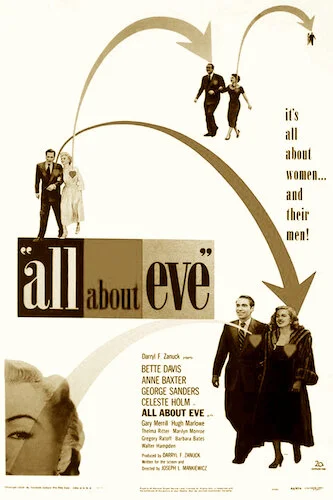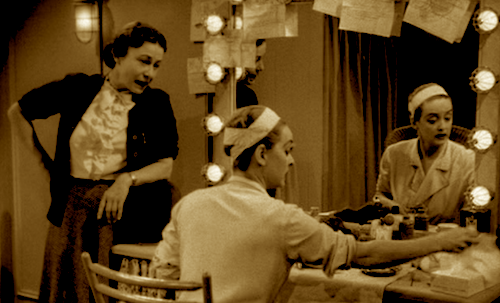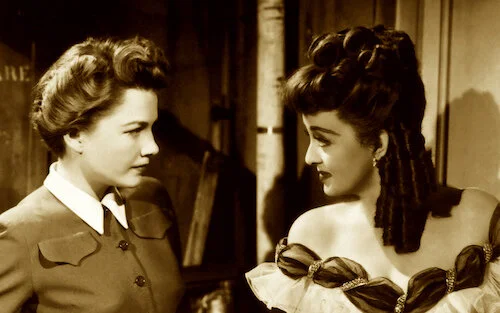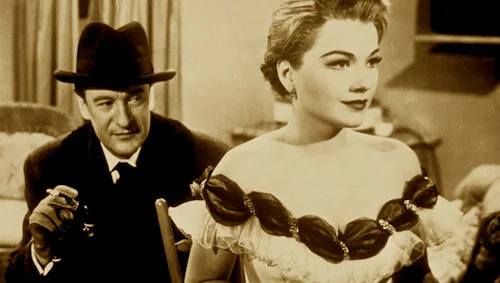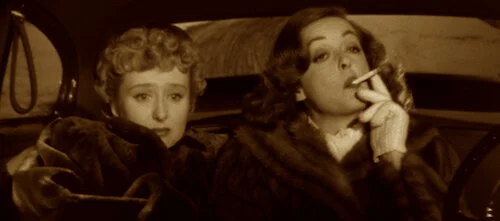All About Eve
This review is a part of the Best Picture Project: a review of every single Academy Award winner for the Best Picture category. All About Eve is the twenty third Best Picture winner at the 1950 Academy Awards.
All About Eve’s poster is an engaging one, although its tagline has always bothered me. Here is one of cinema’s greatest comedy dramas, with enough narrative complexity to spawn a plethora of pale imitations for years to come, and the film is pegged as some sort of romantic excursion. “It’s all about women… and their men!”. It actually isn’t. Sure, the lead women have men, and the idea of an affectionate gaze gets passed around, but selling a film as fantastic as All About Eve in such a way is promotional blasphemy. As the poster has become a historic piece of ‘50s cinema, that tagline continues to live on. Don’t listen to it. It’s beyond misleading. The worst part is this is a re-release poster from 1967. Whoever made this poster should know better.
What we do have is a realistic struggle in showbiz, especially for its time (and sadly even today). Women in the entertainment industry having to one-up each other, because the male-dominated industry cannot allow all of the guys and all of the girls. There has to be a shining star. Men can all go to parties together and parlay. Women have to fight for the throne. With pitch perfect casting, we have an acting veteran (Bette Davis, who dishes out her greatest performance ever as the fictitious Broadway icon Margo Channing), newcomer Anne Baxter (playing Channing’s biggest fan Eve Harrington), and even a small part played by Norma Jean Mortenson (which is only significant in a meta, ironic sense, because Mortenson is otherwise known as Marilyn Monroe, and she would go on to be the next showstopper).
Margo Channing in between performances; she is able to open up and be herself.
To reassure my point, All About Eve, the film is an adaptation of the short story The Wisdom of Eve, by actress and writer Mary Orr. Orr based this story on real experiences she either had or noticed. These were the words of a performer highlighting a harsh reality that was not being discussed enough. The screenplay was written by director Joseph L. Mankiewicz, who won an Oscar for his writing. Orr was never even initially credited in the film. That’s exactly what I’m talking about. Granted, Mankiewicz’s screenplay is beyond outstanding, and almost every line is its own joke. However, once again, a woman speaking out was being undermined.
Speaking of the Academy Awards, All About Eve became a reality when both Davis and Baxter were nominated for Best Actress in a Leading Role. Baxter refused to be considered a supporting role (and be nominated amongst Celeste Holm and Thelma Ritter, for the same film). So, she went head-to-head against Bette Davis. Bette. Davis. The Bette Davis. Well, you may know how this story ends. Davis won, right? Wrong. Baxter’s inclusion split the vote between her and Davis, so All About Eve came out empty handed in this category: Judy Holliday won for Born Yesterday. In many ways, All About Eve is a real phenomenon, either as a message on double standards in an industry, or as a cautionary tale on letting ego dictate your fate.
The main source of tension is amongst hard working artists trying to usurp one another for the spotlight.
I’m sure most of us know the story by now. Eve Harrington goes backstage to give Margot Channing her deepest appreciation, only for Channing to take her on and help her find her feet. Soon enough, Harrington becomes the buzz of the town, and she uses this opportunity to overthrow Channing. Well, Channing will not give up her stature without a fight, and thus is the premise for one of Hollywood’s most sarcastic films ever. The majority of the dialogue is drenched in double entendres, backhanded compliments, or with a garnish of eyes set to kill. Depending on the day, All About Eve can either feel like an all out drama (with everyone’s guards up), a complete comedy (as most lines are jabs), or a mixture of the two. There’s never a wrong time to put this film on.
As a huge screwball enthusiast, All About Eve feels like the sunrise of the next day: a time when the genre would have to evolve to survive, or experience its timely death. All of the quick wit is still there, but it’s at a reasonable pace, and without the necessity of hijinks. You’re still being kept on your toes, but it’s not just for the sake of comedy anymore. Now, you’re anxious to see what will happen. Will Channing reign supreme? Will Harrington be the next face of Hollywood? Will someone else swoop in and steal this chance from them both? We start the film off in the present, so we already technically know how this ends, but that doesn’t mean that the story is set in stone. One thing we can learn, is that anything can change. The timing is one hundred percent screwball.
Stares in All About Eve go one of two ways: either out of jealousy, or out of admiration. It’s all about noticing who gets what kind of a gaze when.
After All About Eve, we still had some classic screwball films to come (like Charade or Playtime), but they felt like neo screwballs, or the next phase. All About Eve seemed to be the ushering in of the next wave of comedy, where a film could rest in an ambiguously grey area if it so desired. A comedy-drama? Who ever heard of that? It was an important merge that allowed the film to remain an important piece of movie history, giving it the opportunity to surpass any contemporary films with its already strong legacy.
At the end of the day, it’s a damn fine film to boot. Every single joke lands well. The dramatic turns feel authentic, and not shoved in. Every ounce of sass is much appreciated. Bette Davis has never been better; Oscar or not, her bitter turn remains one of Hollywood’s finest performances. All About Eve is about staring the inevitable in the face, and doing everything in your power to slow it down. It’s as necessary to watch now as it has ever been.
A bumpy ride was warned; a fantastic visual metaphor representing Channing’s battle for her fame.
In 2019, we still have female rappers that are at each others necks to be the top selling artist. We have reality shows that exploit rivalries. Magazines focus on sex appeal, and refuse to waver. All About Eve is as important to hear out, as it is fun to be entertained by. These were originally the words of a female performer trying to alert the world of an injustice. The final result is a classic, but don’t forget the root source here. It’s still prevalent today, not just as a film but as a message. It’s all about Eve, but Eve represents many. The film allows you to see past its glimmer. I suggest you do so.
Andreas Babiolakis has a Masters degree in Film and Photography Preservation and Collections management from Ryerson University, as well as a Bachelors degree in Cinema Studies from York University. His favourite times of year are the Criterion Collection flash sales and the annual Toronto International Film Festival.

